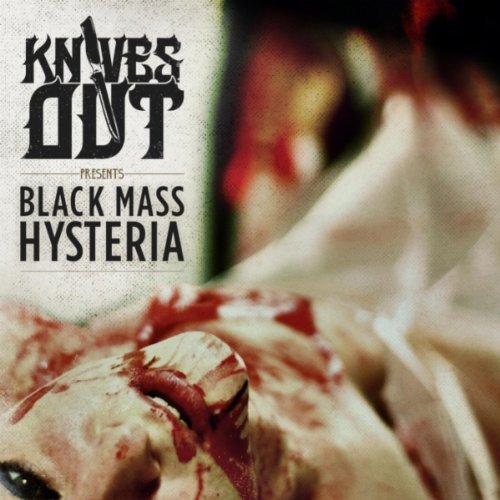
Album Review: Knives Out - "Black Mass Hysteria"
Somewhere between dates on the ridiculous, seemingly endless touring schedule of Polkadot Cadaver, three of that band's members joined up with Tom Maxwell (Hellyeah) and Tommy Sickles (ex-Nothingface) to put together an album under the name of "Knives Out." The resulting product, "Black Mass Hysteria," is both an unflinching celebration of metal and a rolling, thunderous ride.
To fans who have followed these musicians through their various career moves, they would probably say that Knives Out sounds aurally closest to Hellyeah. The most apt description I can personally provide is that "Black Mass Hysteria" crosses many elements of metal in the late 90's, swirling pieces of Marilyn Manson and Fear Factory (of that era) into a uniform slurry. Whether or not that's a compliment is very much up to the reader's preference.
Speaking in broader strokes however, "Black mass Hysteria" shares a resemblance with the seemingly lost era of American heavy metal that started around 1994-5 and mysteriously dropped dead right around 2002. This was the sound of acts like White and Rob Zombie, Powerman 5000, Drowning Pool and Disturbed (for their first album, at any rate.) That era was characterized by loud, full productions, rife with dirty, distorted guitars and favoring ringing cymbal crashes. It is an affect based in the simple themes of rock and roll, but amplified a hundred times to make for a solid, heavy wall of noise.
Album opener "Hide in the Sky" thuds along in a pace perfect for this entire ideal, and comes complete with a chorus that shouts each lyric rather than sing it. The cadence of the chorus is extremely similar to Clutch's "Drink to the Dead," though it is much more powerful and much less wistful. So long as we're on the subject of Clutch though, Knives Out has more than a couple tracks on this album that could have cut muster on the older band's "Pure Rock Fury." This first track or "Pink on the Inside" swagger with the kind of rock and metal bravado that made that album work, and Todd Smith cops a vocal style similar to that of Neil Fallon's.
The pounding gallop of "Swollen Mistress" is the band's most magnetic track, drawing the listener in with an infectious groove (not the band featuring Robert Trujillo,) and a long drum buildup custom built for mosh pit mayhem. It is in these moments when Knives Out shows the truest form of their personality, as the music comes easy and feels comfortable. The same goes for the pummeling back nine of "Robot Babylon."
Mixing of all the elements and styles listed above leads to a song like "Surrounded by Demons," which features a staccato stop and start drum beat with a dominant, hammering bass line, all topped with Smith's intentionally thin singing (not screaming) voice. Tracks like this tread the line of trying too many things at once, but ultimately fall on the good side, keeping a number of different juggled balls in the air at one time.
As the astute reader has probably figured out, that means there are times when it falls flat, and that is true. Album finisher "The First Time I Discovered a Dead Body" is a song that tries to take on too much, and be too many things to too many people. It's a messy, partially assembled affair, trying to turn on a dime between rocking sing-along metal anthem and high-speed, fiery bullet train. An ambitious effort, but it doesn't gel like the other tracks do.
What's odd is that apart from that, the album's other fault is in having too many songs that sound the same. "Blood Everywhere" and "Eat Your Heart Out" are functionally the same song, and even a pretty decent tune like "Swollen Mistress" isn't that far outside the penumbra of the rest of the album. To that end, "Black Mass Hysteria" lacks a certain Je ne sais quoi, a distinguishing characteristic that puts it over the top. No doubt, with more time spent together, the talent that is part and parcel to these musicians can rectify this for future recordings. These are talented players, of that there is no doubt.
Knives Out has produced a solid album that doesn't transcend, but serves as a ripe reminder that the noisy, foot-stomping, balls-out era of American metal died far too soon, and needs to be brought back post-haste. While their album "Black Mass Hysteria" takes itself a little seriously, the overall attitude of efforts from that era is intact, and it nonetheless brings to bear many of the best facets of that part of metal's history. There are some missing pieces, not the least of which is that sense of over-the-top fun, but this is an adequate record that hopefully leads to future releases, as much in this style as from this band.

